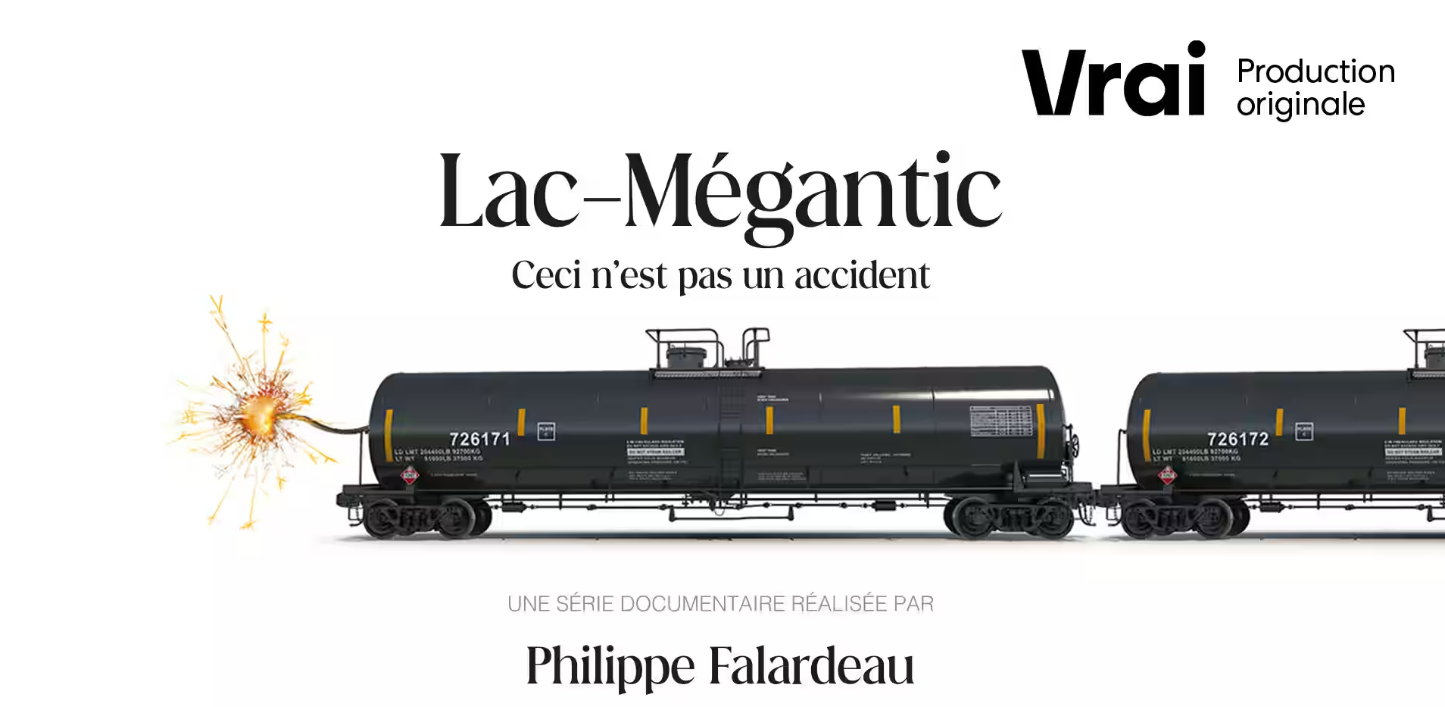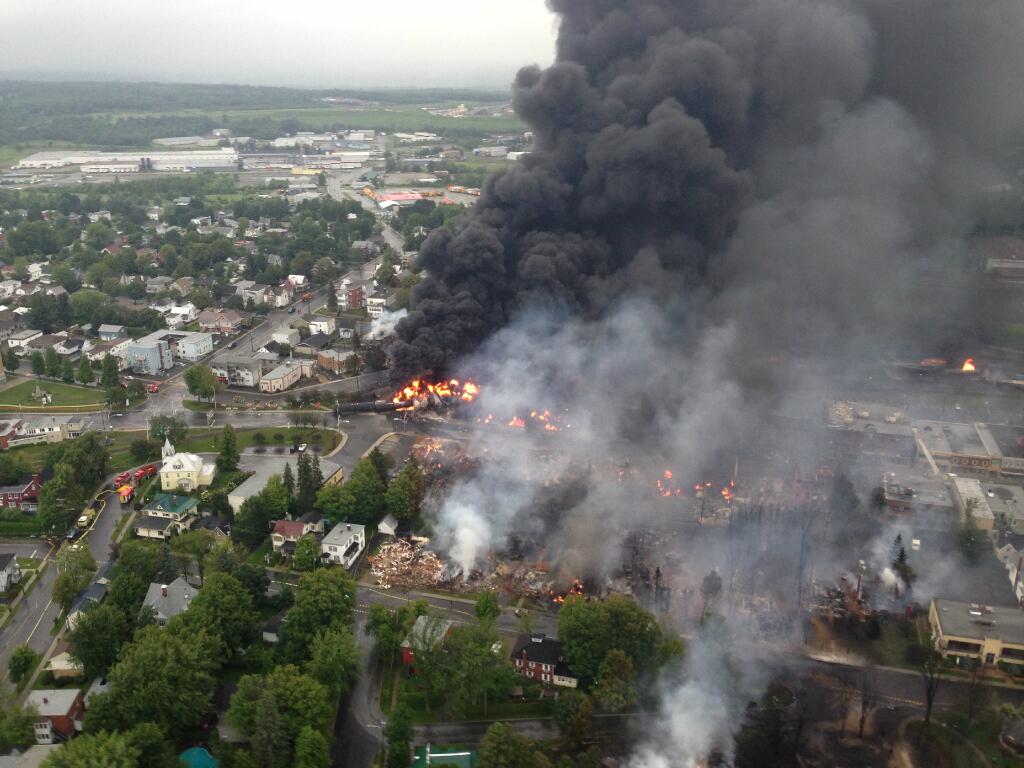
The Lac-Mégantic tragedy, in which 47 people lost their lives following a train derailment, is 10 years old today.
At the time, the events of July 6, 2013 generated a heap of criticism against the railroad company Montreal, Maine and Atlantic (MM&A) and the rail industry in general. Quebec filmmaker Philippe Falardeau’s recent documentary, Mégantic: ceci n’est pas un accident (“Mégantic: this is not an accident”), revisits the events and sheds new light on this huge scandal.
This well-crafted four-part series takes us to the heart of the rail industry. It looks back over the events and shows us that, ten years on, nothing has changed and nothing has been learned. The few private companies that run the industry can still do as they please and keep safety to a minimum.
The facts presented point to a frightening conclusion, as Falardeau states: “The subtitle is ‘this is not an accident’, but it might as well have been ‘it’s going to happen again’.”
It is capitalism that is guilty, and it is capitalism that needs to be overthrown if we want to prevent another disaster.
A catastrophe waiting to happen
The first episode, “Itinerary of a ticking time bomb”, recounts the background and the countless errors and negligence committed by MM&A and Canadian Pacific (CP), the company that oversees freight transport in Canada.
In the 2000s, CP was getting rid of rail lines in poor condition, and MM&A bought up the one that ran through Megantic. This was a gold mine for the company, as the line ran all the way to North Dakota, where shale oil was being extracted. Naturally, MM&A didn’t invest in repairing the line, nor did CP before it.
MM&A also pushed for the right to have only one driver per train. In the documentary, former MM&A CEO Ed Burkhardt explains, “The guys wanted a pay raise. We told them, ‘It could be done, but only if productivity goes up too. For that, you have to agree to drive the trains solo.”” Workers were thus forced to choose between financial security and physical safety.
The CEO goes on to candidly explain that Transport Canada didn’t approve this method as such, but “didn’t get in the way”. The authorities simply turned a blind eye to the MM&A cuts.
The culture of negligence tolerated by all can be seen at every step the train took from North Dakota to devastate Megantic.
Already in North Dakota, the train’s safety data sheets had been falsified, to remove the mention that the contents were extremely hazardous oil. This was the 72nd time such a document had been falsified by a CP or World Fuel employee, showing that this is a common practice.
In Farnham (200km from Lac-Mégantic), MM&A takes the train from CP. Tom Harding, later to become the scapegoat, boards the locomotive, the “5017”. The locomotive isn’t functioning properly. Harding didn’t know that the day before, another locomotive engineer had had so much trouble with the 5017 that he sent a fax to the U.S. headquarters saying it had to be withdrawn. On the morning of July 5, this engineer went to the MM&A boss’s office and asked that the locomotive not be taken out—he was told to stop complaining.
On the evening of July 5, at the end of his shift, Harding parks the train in Nantes (17km from Lac-Mégantic) and applies seven hand brakes and the independent brakes, but not the automatic brakes. Anne-Marie Saint-Cerny, author of books about the tragedy, explains that Harding had been disciplined a few months earlier for applying the automatic brakes—because it delayed the departure of trains the next day! As far as the company is concerned, the trains have to leave as quickly as possible so as not to delay the profit machine, and safety goes out the window.
The rest of the story is already known. A fire starts in the train on the evening of July 5; firemen extinguish the fire but also the engine, which slowly releases the independent brakes; the seven handbrakes are insufficient to hold the train; it starts up again, without a driver, and rolls down the hill to hit Megantic head-on.
A whole series of conditions created by the negligence of profit-hungry bosses ultimately caused a predictable catastrophe. If you push a man in front of a moving train, it will be considered murder. But if you let old trains full of hazardous materials with inadequate safety standards devastate a city, it will be considered an “accident”. This is an example of what Friedrich Engels called “social murder”.
The big guys never lose
As the famous saying goes, the laws are like spiders’ webs—they catch flies, but let hornets go free.
The second and third episodes show how the MM&A parasites avoided consequences, while the workers involved were treated like horrible criminals.
Just a few weeks after the derailment, MM&A simply declared bankruptcy, shielding itself from any responsibility for compensation and cleaning up the city. The CEO and his board were never bothered.
On the other side, police officers smashed down the door to Tom Harding’s home with a battering ram, and handcuffed him and his son in the spring of 2014. This was the beginning of the employee’s long legal journey as a victim of the bosses’ negligence. He and two colleagues were charged with criminal negligence causing death. Fortunately, they were found not guilty.
It’s surprising that ex-CEO Ed Burkhardt agreed to be interviewed for a documentary so critical of his industry. But his honesty, insensitivity and arrogance are useful in unmasking the mentality of the capitalists who run the world. Burkhardt says, to clear his name: “The company is a set of books and a bank account. It’s people who committed the criminal act, not the company.”
He’s right about one thing. These companies are a mere bank account, thinking only in terms of money and profits. If that means less safety and one conductor per train, so be it, and to hell with the consequences.
As if the tragedy wasn’t heartbreaking enough in itself, residents of Mégantic were hit again just a few months later. The third episode of the series sheds light on another aspect of the affair: expropriation by big business.

No sooner had the dust settled than residents of Fatima, a neighborhood near downtown, were in a hurry to sell their homes to contractors. With downtown destroyed, big business wanted to rebuild quickly. A Jean Coutu pharmacy was needed, Metro wanted a new grocery store and needed space.
One lady testifies to the arrival of men in luxury cars wanting to buy their houses. They wanted to buy quickly; they entered the houses and asked to sign papers. They threatened them with expropriation if the inhabitants refused. The lady in question refused, and her house was expropriated while she was away on vacation. Under capitalism, private property is supposed to be sacred—but workers’ property is worth nothing compared to that of capitalists.
To top it all off, a few months after the derailment, the trains started running again—with an even steeper curve because of the incident! As incredible as it may seem, trains packed with hazardous materials are still running through Lac-Mégantic to this day.
So it is with capitalism: even after an unparalleled tragedy, business was to continue as usual.
Nothing has changed
The fourth and final episode takes us back to 2019, when another derailment, at Field, British Columbia, caused a commotion. This episode brings everything together, showing that fundamentally nothing has changed in the rail industry since Lac-Mégantic.
In this accident, the extreme cold damaged the brakes, and the train went out of control. All three employees on board died in the derailment.
Philippe Falardeau’s interviews lift the veil on the rail industry in general, and on the practices of Canadian Pacific, Canada’s leading railroad company, in particular. The picture is damning.
CP has its own police force that “investigates” incidents such as derailments. An ex-police officer, speaking on condition of anonymity, explains that the police’s only concern is to prevent the interruption of rail traffic, as any stopped train costs the company money. “Everything else is irrelevant”.
In Field’s case, two ex-police officers explain that the company covered up the facts. The CP investigator, who was honestly trying to get to the bottom of the incident, was being stonewalled, and pressure was applied to drop the investigation. The Transportation Safety Board (TSB), a federal agency, buckled under pressure from CP and did not open a criminal investigation.
What is revealed in the documentary is an industry left to its own devices, where companies do whatever they want, and Transport Canada and the federal government turn a blind eye and bow to business.
Ron Kaminkow, president of the North American union Railroad Workers United, explains that, after the Field derailment, Transport Canada issued an emergency decree stipulating that hand brakes must be applied when trains are stopped in an emergency. Within weeks, CN and CP appealed this decision.
In February 2020, following a derailment in Saskatchewan, Transport Minister Marc Garneau ordered speed restrictions for trains. A few days later, he backed down under pressure from the railway companies. A lawyer interviewed concludes: “These people can do whatever they want and they say: everything we do is right, and if you interfere with it, you’re interfering with Canada’s supply chain.”
Under capitalism, workers’ lives and health are no match for the imperatives of profit; safety measures are seen as inconvenient costs. This is the case in warehouses, on construction sites and in factories.
It was CP that ended up buying back the rails from the MM&A, which are now highly profitable thanks to oil from North Dakota.
The documentary ends with the battle for a rail bypass in Lac-Mégantic, a demand designed to prevent trains from passing through downtown. This project is supposed to bring peace of mind to the residents. But its primary aim is to enable trains to travel faster (65km/h instead of 20km/h), and be longer (up to 5km!), putting the area around Mégantic at risk of accidents. And this project will be entirely paid for by taxpayers, with CP reaping all the profits. It is a final slap in the face, ten years after the tragedy.
Capitalism is to blame
Philippe Falardeau’s moving documentary reveals how the bosses rule the rail industry like kings, to the detriment of all safety considerations. Forty-seven deaths were not enough to change anything.
All that matters is that the (longer) trains run (faster) and fatten the railway companies’ bank accounts. A former TSB investigator puts it bluntly: “To me, the job of a minister as the government sees it is to make sure the economy isn’t harmed… A lot of people talk about safety being the number one priority, but it’s usually the number two. Number one is making money.” It’s another way of saying what Marx said long ago: government is just a committee that manages the affairs of the ruling class.
The documentary stops, however, at the threshold of the inevitable conclusion: it is private property and capitalism which are responsible. The entire capitalist system is guilty.
Ten years on, many in the rail industry are pointing out that another such catastrophe is entirely possible. Even more sickening is the fact that the conditions are still ripe for a same incident in the same place, at Lac-Mégantic.
But nothing the documentary describes is abnormal: profits come first, that is how it works in every industry. This documentary is an illuminating insight into the horrors of the capitalist system. The rail industry is a glaring example of this in Canada.
Justice will come for the victims of Lac-Mégantic when, instead of a capitalist system where a few companies can rule the world, a democratic, socialist economy organized to meet people’s needs will replace it. We must fight for such a society before capitalists further destroy our planet and the people who live on it.

